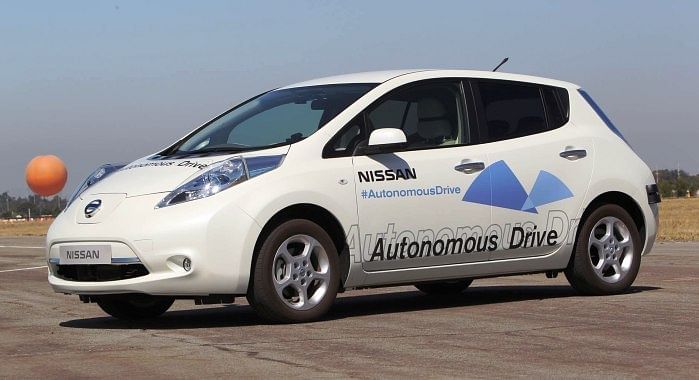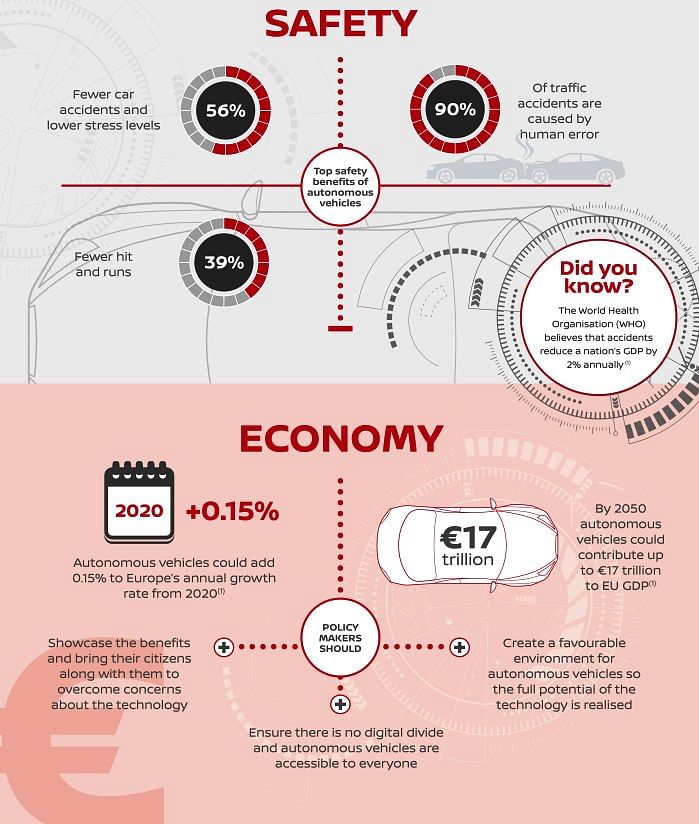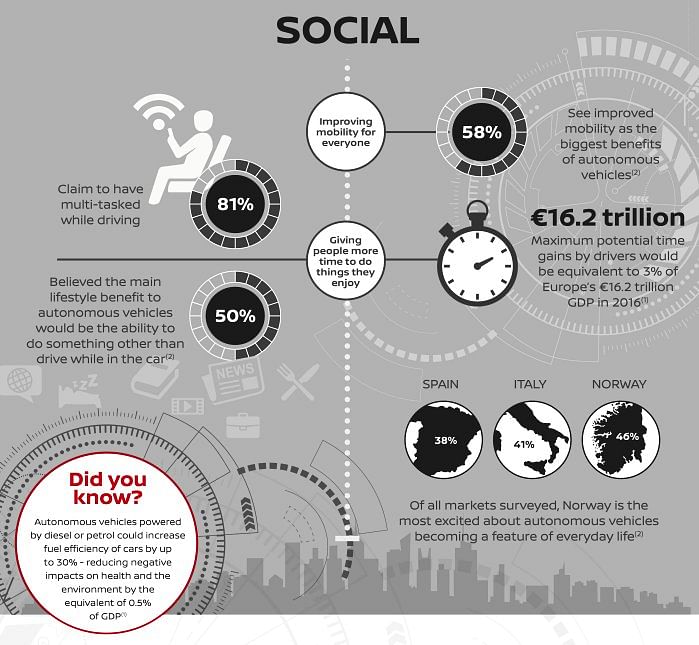Autonomous vehicles to contribute €17 trillion to European economy by 2050
Europe’s most comprehensive autonomous drive review of consumer attitudes and government policy reveals economic and social opportunities of new car technology.
The real financial and social impact of autonomous driving vehicles on European roads has been revealed for the first time.
'Freeing the Road: Shaping the future for autonomous vehicles' is an independent report by think-tank Policy Network commissioned by Nissan Europe to analyse both the social and economic opportunities offered by autonomous drive technologies.
The report also highlights the key steps that need to be taken by governments and regulators to overcome technological and social challenges of autonomous drive. Focusing on Germany, Spain and the UK – the report highlights crucial features of the policy debate around autonomous vehicles and assesses the likely economic impact for the region as a whole.
The new independent economic analysis shows that autonomous vehicles will start adding 0.15 percent to Europe's annual growth rate in the decades to come. As a result, the European (EU-28) gross domestic product will, cumulatively, be 5.3 percent higher in the year 2050 than currently, by which time autonomous vehicles will have contributed a total of €17 trillion (Rs 129,948,000 crore) to GDP.
Paul Willcox, chairman of Nissan Europe, said: "This independent report highlights that we are in the midst of a social and economic revolution. It shows that autonomous technology will have a fundamental impact not just on the automotive industry but across European economies and societies and it suggests that leadership within all levels of government is needed.
"At Nissan we believe, for the full benefits of autonomous drive technologies to be realised, governments and municipalities across Europe should review the report's findings, work hand in hand with the automotive industry, and play a vital role in ushering in this new technological era."
Comprehensive pan-European consumer study

Supporting this independent report is a comprehensive pan-European consumer study which has identified what people see as the main benefits of autonomous driving.
The Nissan Social Index: Consumer attitudes to autonomous drive surveyed 6,000 adults across six European countries and found:
Improved mobility for everyone is considered one of the biggest advantages of autonomous cars (58 percent).
More than half (52 percent) of respondents say that the biggest positive impact on society would be a reduction in accidents caused by human error, followed by removing unsafe/poor drivers from the road (43 percent).
Fewer car accidents and lower stress levels were rated equally as the top health benefits (56 percent).
Four out of five respondents (81 percent) claim to have multi-tasked while driving. Therefore, it is unsurprising that the main lifestyle benefit of autonomous cars is the ability to do something other than driving when in the car (50 percent).
One in four (23 percent) of those who plan to buy a car in five or more years would consider buying an autonomous car.
Political will needed for an autonomous vehicle eco-system
Willcox added: "What's clear from the research published today is that political decisions makers across Europe need to prioritise autonomous vehicle policies to create a favorable environment that will see this technology flourish. The customers want it, and are starting to see the benefits of an autonomous future, but we need the right legislative environment to enable this exciting new era of mobility to thrive.
"We strongly advocate that policy makers continue to work collaboratively with industry, so that together we can ensure that the many social and economic benefits highlighted today are made a reality in Europe."
The survey’s findings revealed
Nissan Europe commissioned a survey in October 2016 examining people's attitudes towards autonomous drive technologies and the future of mobility. In total, approximately 6,000 people were polled across six European countries – UK, France, Germany, Spain, Italy and Norway.
Enabling greater freedom: The study revealed that the vulnerable in society had most to gain from autonomous drive technologies, with disabled people (57 percent), the elderly (34 percent) and the visually impaired (33 percent) mentioned by the majority of Europeans. With a growing elderly population, there is concern that lack of access to mobility solutions could lead to isolation and increased dependency on the goodwill of others, posing huge problems for the state. Autonomous vehicles could provide a solution to this ticking time bomb, providing a renewed sense of freedom through increased mobility.

Protecting health & well-being: Survey respondents also saw multiple benefits for their health and well-being too. The report revealed fewer car accidents and lower stress levels were rated as the top health benefits of autonomous cars by 56 percent of respondents. Other health benefits included fewer hit and run accidents (39 percent) and more free time (30 percent), suggesting the technology could reduce the rise in anxiety and stress-related disorders by giving people back precious time and minimising time spent navigating stressful road situations.
Delivering enhanced safety: Respondents were clear that the potential safety benefits of autonomous drive cars would have the biggest impact on the world. Over half of respondents (52 percent) believed autonomous cars could reduce the number of accidents caused by human error, 43 percent felt it would get unsafe drivers off the road and 34 percent believed it would lead to fewer drunk drivers on the road.

Four out of five respondents (81 percent) claim to have multi-tasked while driving. 68 percent of people confessed to changing the radio station and 42 percent revealed they have eaten a meal or snack whilst driving. Therefore, it is unsurprising that the main lifestyle benefit of autonomous cars is seen as the ability to do something other than driving when in the car (50 percent). Reading books or catching up on news is what most of Europe said they'd do with their extra time in the car (37 percent) followed by sleeping (33 percent), getting work done (30 percent) and watching TV or films (20 percent).
But of course, as with any new technology, there are concerns too. 48 percent of respondents said the biggest disadvantage of autonomous cars was the possibility of the technology not working, followed by not having full control of the vehicle (39 percent) and putting people like taxi drivers out of a job (28 percent).
Recommended:
RELATED ARTICLES
Autoliv Plans JV for Advanced Safety Electronics With China’s HSAE
The new joint venture, which is to be located strategically near Shanghai and close to several existing Autoliv sites in...
JLR to Restart Production Over a Month After September Hacking
Manufacturing operations at the Tata Group-owned British luxury car and SUV manufacturer were shut down following a cybe...
BYD UK Sales Jump 880% in September to 11,271 units
Sales record sets the UK apart as the largest international market for BYD outside of China for the first time. The Seal...






 By Autocar Professional Bureau
By Autocar Professional Bureau
 30 Nov 2016
30 Nov 2016
 6032 Views
6032 Views





 Ajit Dalvi
Ajit Dalvi




